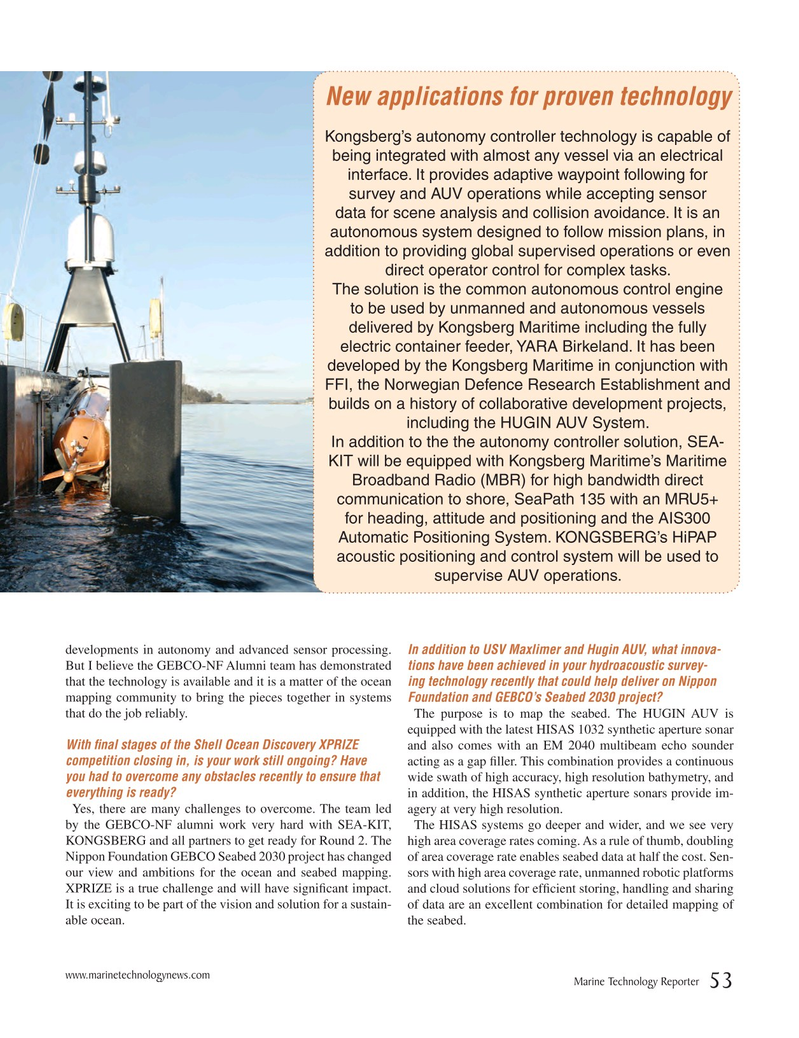
Page 53: of Marine Technology Magazine (September 2018)
Autonomous Vehicle Operations
Read this page in Pdf, Flash or Html5 edition of September 2018 Marine Technology Magazine
New applications for proven technology
Kongsberg’s autonomy controller technology is capable of being integrated with almost any vessel via an electrical interface. It provides adaptive waypoint following for survey and AUV operations while accepting sensor data for scene analysis and collision avoidance. It is an autonomous system designed to follow mission plans, in addition to providing global supervised operations or even direct operator control for complex tasks.
The solution is the common autonomous control engine to be used by unmanned and autonomous vessels delivered by Kongsberg Maritime including the fully electric container feeder, YARA Birkeland. It has been developed by the Kongsberg Maritime in conjunction with
FFI, the Norwegian Defence Research Establishment and builds on a history of collaborative development projects, including the HUGIN AUV System.
In addition to the the autonomy controller solution, SEA-
KIT will be equipped with Kongsberg Maritime’s Maritime
Broadband Radio (MBR) for high bandwidth direct communication to shore, SeaPath 135 with an MRU5+ for heading, attitude and positioning and the AIS300
Automatic Positioning System. KONGSBERG’s HiPAP acoustic positioning and control system will be used to supervise AUV operations.
developments in autonomy and advanced sensor processing. In addition to USV Maxlimer and Hugin AUV, what innova-
But I believe the GEBCO-NF Alumni team has demonstrated tions have been achieved in your hydroacoustic survey- that the technology is available and it is a matter of the ocean ing technology recently that could help deliver on Nippon mapping community to bring the pieces together in systems Foundation and GEBCO’s Seabed 2030 project?
that do the job reliably. The purpose is to map the seabed. The HUGIN AUV is equipped with the latest HISAS 1032 synthetic aperture sonar
With ? nal stages of the Shell Ocean Discovery XPRIZE and also comes with an EM 2040 multibeam echo sounder competition closing in, is your work still ongoing? Have acting as a gap ? ller. This combination provides a continuous you had to overcome any obstacles recently to ensure that wide swath of high accuracy, high resolution bathymetry, and everything is ready? in addition, the HISAS synthetic aperture sonars provide im-
Yes, there are many challenges to overcome. The team led agery at very high resolution. by the GEBCO-NF alumni work very hard with SEA-KIT, The HISAS systems go deeper and wider, and we see very
KONGSBERG and all partners to get ready for Round 2. The high area coverage rates coming. As a rule of thumb, doubling
Nippon Foundation GEBCO Seabed 2030 project has changed of area coverage rate enables seabed data at half the cost. Sen- our view and ambitions for the ocean and seabed mapping. sors with high area coverage rate, unmanned robotic platforms
XPRIZE is a true challenge and will have signi? cant impact. and cloud solutions for ef? cient storing, handling and sharing
It is exciting to be part of the vision and solution for a sustain- of data are an excellent combination for detailed mapping of able ocean. the seabed.
www.marinetechnologynews.com
Marine Technology Reporter 53
MTR #7 (50-63).indd 53 MTR #7 (50-63).indd 53 9/6/2018 11:11:02 AM9/6/2018 11:11:02 AM

 52
52

 54
54
